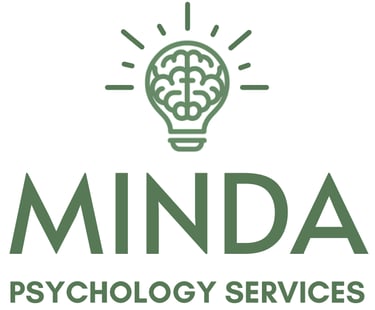
The Reality of Schizophrenia
Unpacking schizophrenia and the factors associated with this debilitating disorder.
ARTICLESCHIZOPHRENIA
Sharifah Diana, Registered Clinical Psychologist
11/10/2025
Introduction: The Reality of Schizophrenia
Schizophrenia… it is the most serious mental illness (to date), and also the most stigmatised one of them. It is a mental illness that causes debilitating disturbances such as delusions and hallucinations. Delusions are beliefs that feel so real and true, even though they are false and untrue. The belief is so strong despite evidence against the delusional belief. It can be like believing you’re being controlled by something or someone, being stalked by someone and many others. Hallucinations would mean to experience something that’s not there. It could be auditory (hearing voices), visual (seeing something that’s not there), tactile (feeling on your skin), and more.
It is the mental illness people speak about when they talk about being ‘crazy’, ‘gila’, ‘tak siuman’, and all the mean, painful labels that come with it. One with schizophrenia loses touch with reality, not knowing what’s real or not, and honestly that sounds terrifying and scary! Not being able to trust your mind? What do you mean?!


Common Misconceptions
The earliest memory I have of learning about schizophrenia is that it was actually misunderstood as multiple personality disorder, because people with schizophrenia hear voices other than their own. The difference would be that with schizophrenia, your identity and personality are intact. So you’re hearing voices that aren’t your own. It is the disruption of your thoughts and reality. Whereas for multiple personality disorder, or now called Dissociative Identity Disorder (DID), you would be having split personalities, or alters, as we call them. Not necessarily voices. The presentations would also be different between hallucinations and delusions in a schizophrenic patient, versus the multiple personality switching in DID.
Prevalence and Causes
Prevalence? Normally diagnosed in adulthood, and if you have a family history of schizophrenia, there is a chance you MAY get it (we call it a biological predisposing factor). There are childhood-onset cases, but it’s rare.
Why does schizophrenia happen? There is no exact cause of schizophrenia, but more of a combination of factors that can make it more susceptible for a person to develop the condition. The combination of biological + psychological + environmental factors. So it is the interaction between genetic predisposition (a family member of yours being diagnosed with schizophrenia and/or struggles with the symptoms but is undiagnosed), and environmental influences (pregnancy and birth complications, childhood stress or trauma, substance use, etc.) that can increase the risk of developing schizophrenia. Brain chemistry and structures such as chemical imbalances in neurotransmitters can also contribute to the disorder.
According to WHO, schizophrenia affects approximately 23 million people or 1 in 345 people (0.29%) worldwide. The rate is 1 in 233 people (0.43%) among adults. It is not as common as many other mental disorders, and onset is most often during late adolescence and the twenties, and tends to occur earlier among men than among women.
Treatment and Recovery
And how to treat it? Well, it’s a combination of medication, psychoeducation, family interventions, cognitive behaviour therapy and psychosocial rehabilitation (life skills training). Getting support through assisted living, supported housing and supported employment can greatly help and let those with schizophrenia thrive in life. Do we have that in Malaysia? Honestly - limited. And scarce. Hence, the first line would be getting antipsychotic medication, and then psychosocial interventions. A key recommendation is early intervention - the earlier the better!
Can people with schizophrenia live a fulfilling life? Yes! Just like any mental illness, it’s about good management of the symptoms, and getting real good support. Getting treatment. Having awareness and openness and acceptance of the mental illness you’re experiencing. Which allows you to be accepting and adhere to treatment. And of course, support from the community. Destigmatizing mental illness like schizophrenia, by being supportive, non-judgmental, empathetic and kind to those battling with schizophrenia. It is a mental illness, which means it is debilitating. It can cause a significant disability in one’s life. It interferes with your ability to function on a daily basis - getting a job, maintaining a job whilst dealing with the symptoms of it, which can impact financial health, safety, hygiene, cleanliness and so forth.
History of Schizophrenia in Malaysia
One of the earliest and first built asylums was the Central Mental Hospital in Tanjung Rambutan, Perak - opened in 1911. This is where all the slurs came about “Awak ni dari tanjung rambutan” to imply one is ‘crazy’ or bad. For a long time, treatment was primarily institutionalised and custodial, due to limited local expertise and resources.
Schizophrenia’s treatment has evolved over the years. Back in the day, it was pretty much doing exorcisms... whether it worked or not I don’t know because there’s no data on it. Then when the medical model came about, which was a shift from just spiritual practices, people with schizophrenia were treated with lobotomies and drilling into the skull to relieve the pressure from the skull (assuming it’s pressing onto the nerves in the brain which is what’s causing all the symptoms), and also to release the demons from their brains through the hole they’ve drilled. Eventually, less invasive treatments were developed - like electroconvulsive therapy (ECT) and psychopharmacological treatment (psychiatric meds).
Cultural Beliefs and Stigma
Schizophrenia was closely linked to demonic possessions and paranormal reasoning — and this is a strong belief and influence in Malaysian culture. I get where it came from, hearing voices that’s not your own, seeing things that no one sees, feeling things that are not there… you would think you’re being disturbed spiritually rather than suffering from mental illness. So with that, a lot of people would actually see spiritual healers FIRST, before coming to see mental health professionals. The implications of this? Honestly sometimes, the symptoms are already really dire — it could have been prevented with early intervention. And with any mental illness, early intervention is the best. Don’t wait till it gets worse before you seek out support.
"Hearing voices that’s not your own, seeing things that no one sees, feeling things that are not there… you would think you’re being disturbed spiritually"
Schizophrenia Research in Malaysia
Yoon et al (2014) set out to consolidate all the research that has been done on schizophrenia in Malaysia. This was hard for me to summarise, because just like the review and research on schizophrenia in Malaysia, the conclusions are elusive and leave a big question mark. And on top of that, there is overall a lack of research and data on schizophrenia in Malaysia despite the number of universities and hospitals in Malaysia. This is a serious implication because the lack of empirical research, evidence and data would mean lack of recognition and acknowledgement from the government, hence getting less resources and budgeting… and the cycle continues.
The Malaysian Context Today
What's the situation like for people with schizophrenia in Malaysia? Honestly, not the best. Maybe not even good. There’s still SO much more room for improvement. Treatment for schizophrenia is heavily reliant on medication, but one with schizophrenia can thrive with getting holistic treatment such as therapy, support groups, psychoeducation and support groups for their families/ support systems — to help them manage their symptoms well, but also to thrive in their lives with schizophrenia.
To be frank, it’s hard to close this writing because it feels like a hanging thread. Many unanswered questions, and devastation when speaking about schizophrenia and how it is in Malaysia. There’s still so many gaps when it comes to treatment and supportive systems in place not only for people with schizophrenia, but overall mental illness in Malaysia. Well, that’s a topic to discuss for another day.
My heart goes out to folks dealing with schizophrenia, you’re so incredible for trying and living. You deserve care, dignity, and a life that’s truly living. You’re not alone, and your story deserves to be heard - do share it with us, and we would love to hear your lived experiences. Let’s keep the conversation going, and push for a system that truly supports every mind that struggles.
References
World Health Organization. (2022). Schizophrenia. World Health Organization. https://www.who.int/news-room/fact-sheets/detail/schizophrenia
Yoon, C. K., Haque, M. A., & Jusoff, K. (2014). A review of schizophrenia research in Malaysia. Middle-East Journal of Scientific Research, 19(9), 1201–1208. https://doi.org/10.5829/idosi.mejsr.2014.19.9.11279
National Institute of Mental Health. (2023). Schizophrenia. U.S. Department of Health and Human Services, National Institutes of Health. https://www.nimh.nih.gov/health/topics/schizophrenia
American Psychiatric Association. (2022). Diagnostic and statistical manual of mental disorders (5th ed., text rev.; DSM-5-TR). American Psychiatric Publishing.
National Health Service (NHS). (2024). Schizophrenia – Symptoms, causes and treatments. https://www.nhs.uk/mental-health/conditions/schizophrenia/
Rosen, C., Jones, N., & Chase, K. A. (2021). Understanding and treating schizophrenia: Contemporary perspectives. Frontiers in Psychiatry, 12, 654556. https://doi.org/10.3389/fpsyt.2021.654556
Sulaiman, A. H., Ahmad, N., & Razali, S. M. (2020). Mental health services and schizophrenia care in Malaysia: Current status and future challenges. Asian Journal of Psychiatry, 54, 102447. https://doi.org/10.1016/j.ajp.2020.102447
Written by
Sharifah Diana, Registered Clinical Psychologist
Diana is one of the co-founders of Minda Psychology Services, and advocates for mental health awareness, acknowledgement, and change in Malaysia. Her work focuses on emotional difficulties, relationship issues, trauma, sexual health and wellbeing, as well as other mental health concerns such as depression and anxiety. Drawing from Emotion-Focused Individual Therapy (EFIT), Cognitive Behavioural Therapy (CBT), and Person-Centred Therapy, Diana helps clients explore their inner world, process difficult experiences, and move toward growth and resilience. Learn more about her here.




Reach Us At
hello@mindapsychology.com
Whatsapp +6014 732 0209




